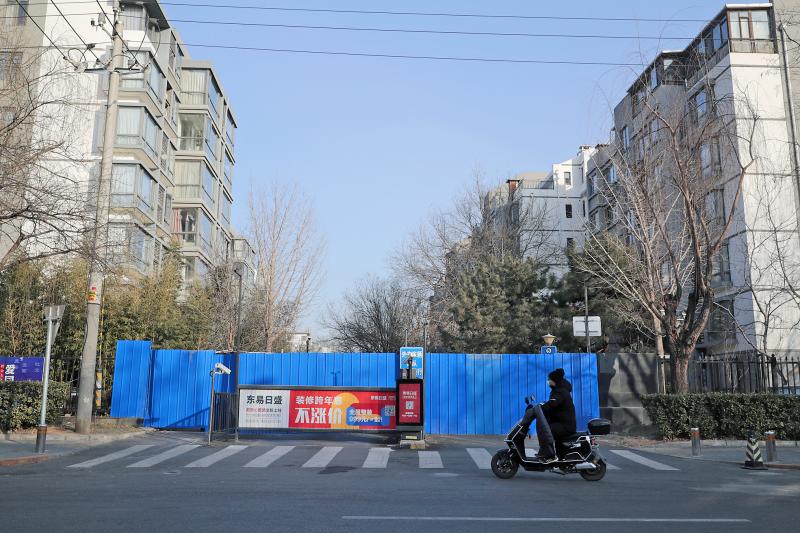Beijing is to require travelers to get a COVID-19 test within 72 hours of arrival in the Chinese capital, state media announced yesterday, a day after the city reported its first case of the SARS-CoV-2 Omicron variant and as it readies to host the Winter Olympics next month.
The city on Saturday reported the first local infection of the highly transmissible Omicron variant, involving a person who had visited multiple malls and restaurants in the previous 14 days. The person had not left the city since the start of this year.
The new rule, effective from Saturday to the end of March, is aimed to help with early detection of Omicron, which is surging globally, and the control of epidemic risks, Beijing Daily, a government newspaper, said on social media.

Photo: EPA/EFE
The capital already requires inbound travelers to take a COVID-19 test within 48 hours of departure for the city and have a “green” code on the city’s health tracking app.
The city and neighboring Hebei Province is to host the Olympics, which start on Feb. 4, inside a “closed loop” separating athletes and other Games personnel from the public.
In Tianjin, a neighboring city that is battling an outbreak involving the Omicron variant, officials found 59 COVID-19 cases in its third round of mass testing starting on Saturday, He Peng, a local government spokesman, told a news conference yesterday.
So far, local cases of the Omicron variant have been detected in at least five provinces and municipalities, prompting cities to impose curbs to stop its spread.
China has not said how many Omicron cases it has detected.
“It is too soon to conclude that Omicron will swamp China’s efforts to suppress COVID,” Capital Economics chief Asia economist Mark Williams said in a note on Friday. “But it is clear that the emergence of more transmissible variants is requiring more frequent interventions... And the economic toll from this vigilance is mounting.”
About 13,000 people have been tested for COVID-19 in the Haidian district where the Beijing case was discovered, but none of the results came back positive, Beijing Daily cited official data as saying yesterday.
However, some religious sites in the city were being closed to visitors as a precautionary measure. Lama Temple, a Tibetan Buddhist monastery in central Beijing, said it was closing down for an unspecified period due to COVID-19 epidemic and control measures.

AGING: As of last month, people aged 65 or older accounted for 20.06 percent of the total population and the number of couples who got married fell by 18,685 from 2024 Taiwan has surpassed South Korea as the country least willing to have children, with an annual crude birthrate of 4.62 per 1,000 people, Ministry of the Interior data showed yesterday. The nation was previously ranked the second-lowest country in terms of total fertility rate, or the average number of children a woman has in her lifetime. However, South Korea’s fertility rate began to recover from 2023, with total fertility rate rising from 0.72 and estimated to reach 0.82 to 0.85 by last year, and the crude birthrate projected at 6.7 per 1,000 people. Japan’s crude birthrate was projected to fall below six,

US President Donald Trump in an interview with the New York Times published on Thursday said that “it’s up to” Chinese President Xi Jinping (習近平) what China does on Taiwan, but that he would be “very unhappy” with a change in the “status quo.” “He [Xi] considers it to be a part of China, and that’s up to him what he’s going to be doing, but I’ve expressed to him that I would be very unhappy if he did that, and I don’t think he’ll do that. I hope he doesn’t do that,” Trump said. Trump made the comments in the context

SELF-DEFENSE: Tokyo has accelerated its spending goal and its defense minister said the nation needs to discuss whether it should develop nuclear-powered submarines China is ramping up objections to what it sees as Japan’s desire to acquire nuclear weapons, despite Tokyo’s longstanding renunciation of such arms, deepening another fissure in the two neighbors’ increasingly tense ties. In what appears to be a concerted effort, China’s foreign and defense ministries issued statements on Thursday condemning alleged remilitarism efforts by Tokyo. The remarks came as two of the country’s top think tanks jointly issued a 29-page report framing actions by “right-wing forces” in Japan as posing a “serious threat” to world peace. While that report did not define “right-wing forces,” the Chinese Ministry of Foreign Affairs was

PREPAREDNESS: Given the difficulty of importing ammunition during wartime, the Ministry of National Defense said it would prioritize ‘coproduction’ partnerships A newly formed unit of the Marine Corps tasked with land-based security operations has recently replaced its aging, domestically produced rifles with more advanced, US-made M4A1 rifles, a source said yesterday. The unnamed source familiar with the matter said the First Security Battalion of the Marine Corps’ Air Defense and Base Guard Group has replaced its older T65K2 rifles, which have been in service since the late 1980s, with the newly received M4A1s. The source did not say exactly when the upgrade took place or how many M4A1s were issued to the battalion. The confirmation came after Chinese-language media reported